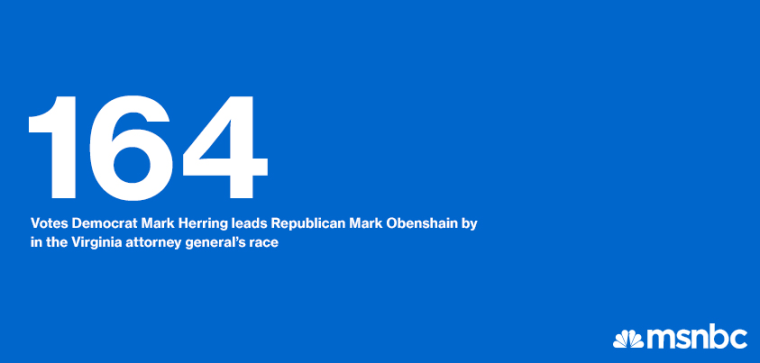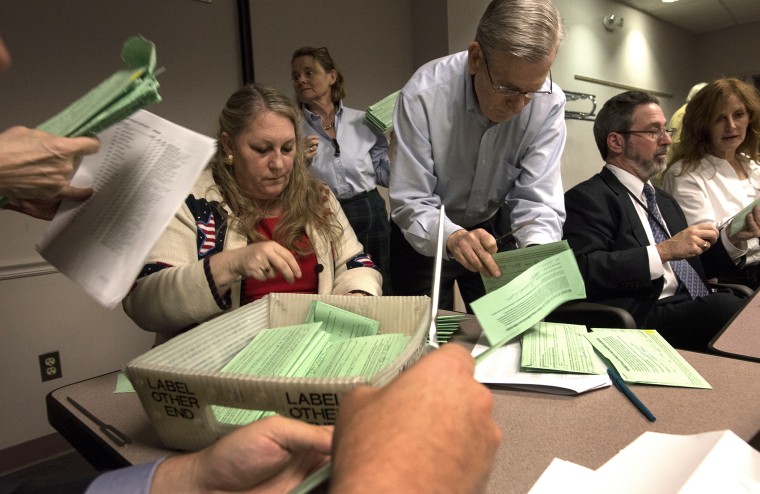In the coming weeks, Virginia could become the new Florida -- at least in the battle for attorney general.
After all localities had finished their counts late Tuesday evening in the state attorney general's race, Democrat Mark Herring held a slim 164 vote lead over Republican Mark Obenshain. The state will certify the results on Nov. 25, setting the stage for a likely recount.
But the close race didn't stop either candidate from declaring victory on Wednesday.
“Voters in Virginia have spoken, their voices have been heard, and I am honored to have won their votes and their trust to become Virginia’s next attorney general,” Herring said in a statement, quickly naming his transition team. Democrats in the Old Dominion and national party officials also boasted that they had swept Virginia's statewide offices and both Senate seats for the first time since 1969.
Obenshain followed suit. In his own press conference Wednesday afternoon, the GOP candidate also named his own transition team and said the race remained in flux until the state certifies the result in just under two weeks. He stressed the very close nature of the race.
"I certainly understand posturing, and I understand that he is ahead at the end of the second stage,” Obenshain said of Herring’s declaration of victory. “Actions speak louder than words, and it's easy to put forth a sense of bravado, but I think it would behoove us all to see what the total is.”
But the Republican quietly stated that if his Democratic opponent was “so confident in his victory surely, he's resigned his Senate seat right?” Both men serve in the state Senate together.
If the vote total remains less than 1% -- right now, Herring leads by 0.01% -- the trailing candidate can request a recount, and if it’s less than 0.5%, the state will pay for the recount.

The situation is nothing new in the commonwealth. The state attorney general’s race saw a similar trajectory in 2005. Then, Republican Bob McDonnell prevailed over Democrat Creigh Deeds by just 360 votes. A recount followed that year that -- it wasn’t concluded until Dec. 21 -- and the race only saw a 37-vote shift toward McDonnell.
But a change in state law -- successfully pushed by Deeds in the legislature -- means that any recount today will be much more intensive than it was eight years ago.
In 2005, only machines with unclear returns on their result tapes had their ballots recounted by the machine. This time, every locality that uses the optical scan machines will have to recount their ballots to get new totals. That still may not lead to a significant shift in numbers, but it’s a much more thorough procedure than in the last attorney general recount. The process has Republican legal observers hopeful the shift that occurred toward McDonnell in 2005 could be magnified for Obenshain to pick up any potential errors or undervotes.
But Democrats think the recount procedure change will protect Herring’s lead -- and maybe even expand it. Many Democratic strongholds, such as Fairfax County, use the optical scan machines, and additional votes for Herring that the machines may have missed or that could be examined further may end up in their column.
There won’t be any additional ballots tacked on to the vote count, though. Fights around the inclusion of provisional ballots are over, and no ballots can be added or subtracted from the overall tally, barring any legal action.
“Democrats gain votes when you recount optical scan ballots,” said one Democratic attorney, explaining that Dem voters are often first-time voters or less experienced, while GOP voters are more “diligent.”
“I would think we would gain a little,” predicted the Democratic lawyer, “but it will be a very, very small change.”
The Cook Political Report's David Wasserman, who was one of the first to notice some of the vote discrepencies in crucial counties, explained on Thursday's The Daily Rundown how social media helped draw attention to the early vote-counting process and even served as a crucial check. But in a recount, the reach of the changes is hard to predict.
"The law of averages suggests that there will be small shifts in both candidates' favor," Wasserman told msnbc. "The canvass has pretty much ensured that there aren't more missing ballot boxes or uncounted voting machines, and Obenshain's problem is that he needs more than dribs and drabs to overcome a 164 vote deficit."
